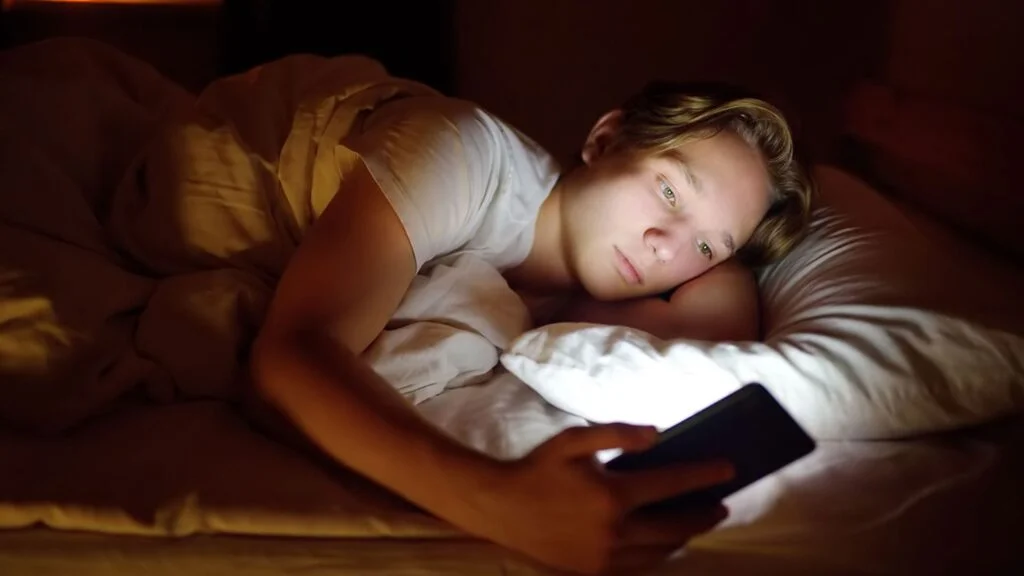
Smartphones have become a make-or-break part of everyday life, keeping you on time for Zoom meetings and parent-teacher conferences and in the loop on the newest sleep hack. But, their impact on sleep, particularly among teenagers, is a growing concern. Most research to date has focused on how teens’ smartphone use affects their sleep and mental health. However, a recent study took a unique angle, shifting the spotlight onto parents’ own smartphone use.
The study, published in Frontiers in Psychology, explores the concept of ‘parental phubbing,’ when parents ignore their children to use their smartphones, and its potential impact on their teen’s sleep. (1) While smartphone use among teens is a pervasive topic in the media, this perspective challenges how adult smartphone use affects younger generations’ mental health and sleep quality and what that means for today’s teens.
What Is Parental Phubbing?
Phubbing is a term combining ‘phone’ and ‘snubbing’ and, in this case, refers to the act of parents ignoring their children in favor of their smartphones. This behavior, which is as old as the advent of smartphones themselves, has become increasingly prevalent in today’s society to the point it’s now often considered the norm.
Traditional parent-child interactions have been turned upside down over the years, potentially negatively impacting children’s wellbeing. Think of how common the sight of parents engrossed in their phones at parks, while pushing a stroller, at restaurants, or family gatherings is, often at the expense of engaging with their children in any meaningful way.
According to the Infant Mental Health Journal, these habits can impact how responsive and sensitive parents are to their child’s needs, which can interfere with children’s attachment development, potentially affecting their mental and relationship health well into the future. (2)
As society continues to embrace the pervasive use of smart devices and screens in every aspect of life, understanding and addressing parental phubbing becomes increasingly essential.
The Study
The study, conducted by researchers at Xinyang Normal University and the China Key Laboratory of Adolescent Cyberpsychology and Behavior, investigates the impact of parental phubbing on adolescents’ sleep quality. It was based on the theoretical model for the “stress–sleep” relationship, a science-based idea of how stress and sleep affect each other. The researchers wanted to determine how sleep could be affected and how that might change depending on certain conditions, such as family status and parental education.
A survey of 781 adolescents was taken using several scales that measure parental phubbing, depression and anxiety, self-control, and sleep quality. The goal was to find out if when parents ignore their kids by focusing on their phones, it affects teenagers’ sleep quality, either directly or through other factors. Plus, they wanted to explore if a teenager’s ability to use self-control changes how parental phubbing leads to negative feelings.
The researchers stress that good quality sleep is a crucial factor in determining the physical health of teens and problems with sleep quality can hinder their development. Sleep issues may include insomnia, frequent nightmares, staying up late, and lack of sleep.
It’s worth noting that this study is the first of its kind to provide empirical evidence for the relationship between parental phubbing and sleep quality problems, so while the data is intriguing and paves the way for a new way of approaching the research on teen sleep issues, more research needs to be done to show a clear connection.
Study Findings — The Impact on Sleep
The study’s findings show the concerning impact of parental phubbing on teen sleep quality. Researchers found that adolescents reporting higher levels of parental phubbing were likelier to experience sleep problems. This suggests that when parents ignore their teens in favor of their smartphones, it can disturb their kids’ sleep.
Negative emotions were also found to play a role, serving as a mediator between parental phubbing and adolescent sleep quality problems. In other words, parental phubbing can lead to adverse feelings in teens, which increases sleep troubles. It’s a sign that parental phubbing takes an emotional toll on their teens, and the lingering emotional impact can manifest in physical health issues, including sleep issues.
Another unique aspect of the study was examining how self-control might influence this relationship. Parental phubbing more consistently led to negative emotions in teens with lower self-control, and this link was significantly reduced in those with better self-control, suggesting self-control is a protective factor, helping to buffer the negative emotional impact of being sidelined for their parents’ phone use.
Previous research suggests phone use leads to distraction and less enjoyment in social interactions. Emotional and psychological aspects of being second to a screen, in turn, have a significant impact on sleep quality, which is closely tied to mental health.
Implications and Recommendations
The findings of this study have significant implications for understanding how parents’ screen use can impact their teens’ wellbeing. Parental phubbing can lead to sleep disturbances, which is not a minor issue given the importance of sleep for physical health and cognitive development during this stage and the emergency-level government warnings that have been issued about teen sleep and mental health lately.
Long-term, these sleep disturbances could potentially lead to chronic sleep disorders and associated health problems. Plus, the emotional toll of parental phubbing, shown by the increase in negative feelings the teens experience, could potentially impact their mental health over time.
Based on the study’s findings, there’s a link between how parents use their phones and the impact these choices have on their teens’ wellbeing, as well as the role of self-control. Fostering self-control in teens, easier said than done for this age group, could buffer against the harmful effects of parental phubbing. At a minimum, this study shows that parents should be mindful of their smartphone use, given its potential impact on their kids’ sleep behaviors and general wellbeing.
According to the researchers, parents are encouraged to set specific ‘phone-free’ times, especially when given the chance to actually communicate and bond with their teens. While many teens hide away in their rooms at this stage, opportunities to connect could include meal times, family outings, or whenever their teen wants to talk or seems to need a sympathetic ear.
Modeling appropriate smartphone habits and healthy sleep hygiene is also a great way to show teens a more balanced way to live. Consider setting boundaries for work-related phone use at home, or designating certain areas of the house as ‘phone-free’ zones. Taking some simple steps can reduce the potential negative impacts of ‘phubbing’ and encourage better sleep and overall wellbeing, which can pay off for generations to come.
Sources
1. Qian Ding,Qian Ding; Siwei DongSiwei Dong; Yongxin Zhang; “Does parental phubbing aggravates adolescent sleep quality problems?” Frontiers in Psychology; https://www.frontiersin.org/journals/psychology/articles/10.3389/fpsyg.2023.1094488/full; February 5, 2023.
2. Katrin Braune-Krickau, Larissa Schneebeli, Jessica Pehlke-Milde, Michael Gemperle, Ramona Koch, Agnes von Wyl; “Smartphones in the nursery: Parental smartphone use and parental sensitivity and responsiveness within parent–child interaction in early childhood (0–5 years): A scoping review” Infant Mental Health Journal; January 15, 2021.


























